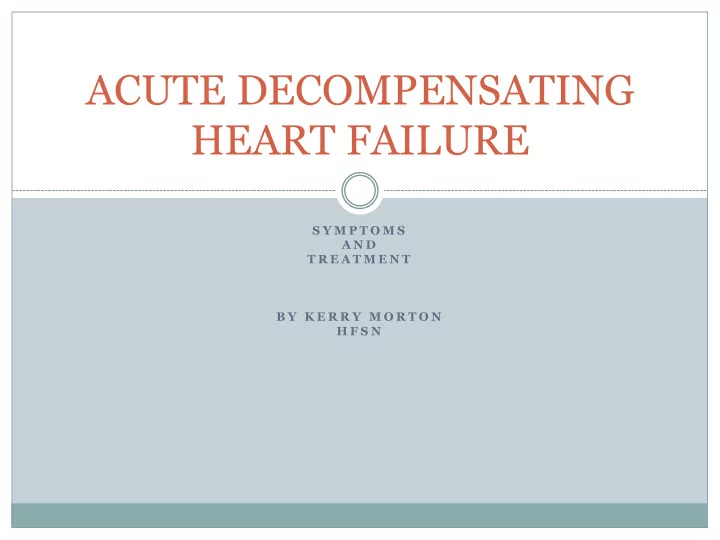

ACUTE DECOMPENSATING HEART FAILURE S Y M P T O M S A N D T R E A T M E N T B Y K E R R Y M O R T O N H F S N
ACUTE HEART FAILURE DEFINITION “The new onset or recurrence of symptoms and signs of heart failure requiring urgent or emergency treatment and resulting in seeking unscheduled hospital care.” Many patients may have a gradual worsening of symptoms that reach a level of severity necessitating urgent care.
CO-MORBID CONDITIONS ASSOCIATED WITH AHF Hypertension Coronary Artery Disease High Cholesterol Diabetes Mellitus Lung Disease, eg COPD Atrial Fibrillation Obesity Renal Failure Anaemia
SYMPTOMS
CATEGORIES OF SYMPTOMS Warm and dry Well perfused No evidence of fluid overload No evidence of decompensating heart failure Warm and wet Well perfused Evidence of fluid overload Decompensating heart failure Cold and dry Poor perfusion No evidence of fluid overload Poor cardiac output Cold and wet Poor perfusion Evidence of fluid overload Decompensating heart failure with a low cardiac output
Breathlessness Worsening chronic heart failure Chest congestion, pulmonary oedema, pleural effusions Cough Frothy pink sputum Wake up at night breathless/panicky Can’t lay flat Other causes of breathlessness Chest infection Pulmonary Embolus Anaemia Anxiety Cancer Lung disease Asthma COPD Bronchiectasis Emphysema
Ascites
Ascites Abdominal discomfort Liver congestion/failure Nausea Feeling full/bloated Increase breathlessness Decreased mobility
Other symptoms Dizziness Weight gain (1 kg = 1 litre) Reduced mobility Palpitations Thirst Lethargy/weakness Chest pain Heart Rhythm Disorders Renal Failure Cachexia Cognitive impairment
Monitoring Daily weights – response to loop diuretic Fluid intake – restrict to 1.5 litre per day Thirst Some patients have been advised to drink more! Make sure they drink enough (over 1 litre) Renal function – U&Es Low sodium; do not encourage an increase in salt intake Acceptance of some renal dysfunction Cognitive impairment Understanding of condition Concordance Liver function - LFTs Blood pressure; sitting and standing Heart rate – ECG Symptoms
Treatment Oral or IV loop diuretics Bumetanide or furosemide IV furosemide Medications Rate control BP control Nephrotoxics (reduction) Other diuretics Thiazide or thiazide like medication Bendroflumethiazide Metolazone Mineralocorticoid receptor antagonist Spironolactone Patient Understanding and Support
Where do we treat At home – oral diuretics HFSNs Hospital admission Ward CCU/ITU AID-HF (Ambulatory Intravenous Diuretic for Heart Failure) HFSNs Consultant Cardiologist Improves the flow between secondary and tertiary health care Prevents an admission
Cardiogenic Shock Hypotension Organ hypoperfusion despite adequate fluid resuscitation Poor perfusion to peripheries Cold and clammy End organ dysfunction; renal, hepatic and central nervous system is common
Deteriorating Patient Respiratory support CPAP or BIPAP Renal Support/Management of fluid overload Continuous Renal Replacement Dialysis Cardiac support - medications Inotropes (Noradrenaline/Dobutamine) Phosphodiesterase inhibitors (Milrinone) Monitored level 2/3 bed GTN infusion – ward level
Conclusion We can all assist in supporting, educating and helping patients with heart failure Patients with chronic heart failure can gradually deteriorate or acutely deteriorate resulting in a hospital admission Early detection and treatment may prevent this progression Education, monitoring and changes in treatment may prevent a hospital admission
THANK YOU FOR LISTENING
Recommend
More recommend